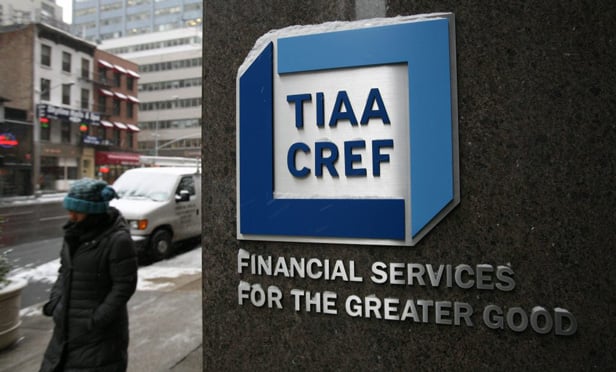 (Photo: AP)
(Photo: AP)
A former employee has sued retirement services provider TIAA and its fiduciaries, alleging mismanagement of its employee retirement plan, TIAA’s Retirement and 401(k) Plans (Teachers Insurance and Annuity Association). The suit alleges TIAA, which provides retirement plans for non-profit institutions, breached fiduciary duties by charging its own retirement plans higher fees than it charged to its clients for the same investments, and by retaining an underperforming in-house fund for 16 years.
On behalf of more than 28,000 participants and beneficiaries of TIAA, law firm Sanford Heisler Sharp McKnight filed a class action lawsuit this week in the U.S. District Court for the Southern District of New York. The complaint alleges TIAA engaged in “multiple breaches of fiduciary duties under the Employee Retirement Income Security Act,” by charging its own Plans higher fees than others for the same investments, including the widely-used College Retirement Equity Fund (CREF), which held over $2 billion of the Plans’ assets and included eight different investment accounts packaged within variable annuities, each with different share classes and fees.
The Complaint alleges that instead of offering the cheapest share class to the Plans’ participants, TIAA included a share class whose fees were higher. As a result, the TIAA Plans paid millions more in higher fees for the same investment option and TIAA reaped millions more in fee income from the Plans’ investments in CREF.
TIAA, which has over $1 trillion in assets under management, also failed to remove its underperforming CREF Growth Fund from its Plans despite 16 years of underperformance, as compared to the fund’s market benchmark, the Russell 1000 Growth Index, and the performance of other comparable large-cap growth funds, costing participants and beneficiaries millions of dollars in retirement savings. Participants of TIAA’s Plans had invested approximately $480 million of their retirement savings in the CREF Growth Fund as of the end of 2023, according to the Complaint.
Recommended For You
The Complaint asserts that, through these actions, TIAA and its Plans’ fiduciaries breached ERISA’s fiduciary duties and engaged in “prohibited transactions” barred by ERISA.
The named plaintiff Brian Byrne filed this case on behalf of the TIAA Plans, which have over $9 billion in assets. Named as Defendants are TIAA, the TIAA Board of Directors and its members, and the TIAA Plan Investment Review Committee and its members.
“Companies that choose to offer in-house investment options to their employees are under a heightened duty to act with an ‘eye single’ to their employees’ interests, yet here, we believe that TIAA breached that duty,” said Charles Field, Co-Chair of the firm’s Financial Mismanagement and ERISA Litigation Practice Group and counsel for Plaintiff and the proposed class.
“Cases like this are an important tool for ensuring company fiduciaries do not abuse their positions of trust, and for protecting the hard-earned retirement savings of employees. This is especially important given the over $2.2 billion in retirement savings invested in the CREF Funds.”
“The fiduciaries of TIAA’s Plans are duty-bound to monitor the Plans’ investments and to remove investment options that are imprudent; no investor wants to be stuck with a dog,” said Russell Kornblith, a Partner and General Counsel at the firm and counsel for the proposed class. “That obligation takes on special importance when the investment product is one created by the company itself. Here, TIAA’s Plan participants have invested over $480 million in TIAA’s proprietary, in-house CREF Growth Fund. TIAA owed these participants a duty to ensure that money was invested prudently and in their best interest.”
Related: UnitedHealth agrees to $69M settlement in lawsuit over ‘low-performing’ 401(k) funds
Sanford Heisler Sharp McKnight has filed the TIAA ERISA complaint on the heels of several significant ERISA class settlements in 2024. In December 2024, the firm filed for preliminary approval of a record $69 million settlement in its multi-year class action against UnitedHealth Group. Earlier in 2024, Sanford Heisler Sharp McKnight also obtained final approval of a $61 million settlement in a long-running ERISA class action against General Electric.
© 2025 ALM Global, LLC, All Rights Reserved. Request academic re-use from www.copyright.com. All other uses, submit a request to [email protected]. For more information visit Asset & Logo Licensing.








